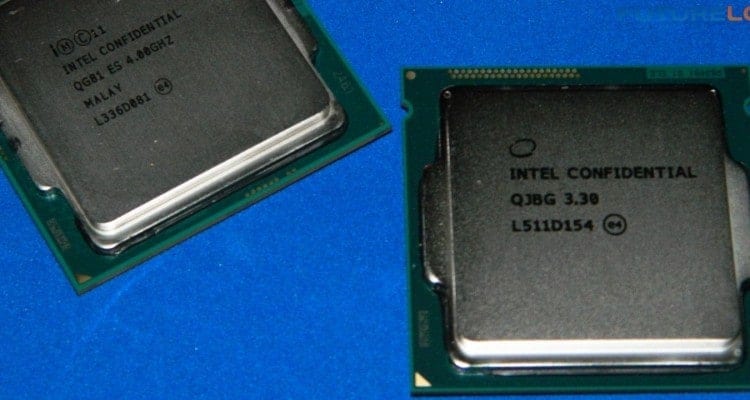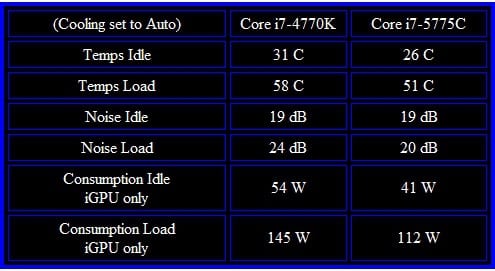- Excellent Power to Performance Ratio
- Capable Overclocker
- Iris Pro HD6200 IGP Handles Most General Tasks
- Price Increase Over 4770K & 4790K
- Performance for price ratio could be better
SANDRA Multimedia and Mathematical
It’s a variable world of scoring when testing on SANDRA. The Core i7-5775C performs slightly better than the Core i7-4770K but only just. Frequencies help the Core i7-4790K more so in others. Lets look at something much clearer next.
Handbrake 10.2
A 375MB snow boarding video was used for this transcoding test. It was converted from 1080p to 720p using quality settings of 10 and 20 RF. Lets see how they work.
This is the most telling real world benchmark. The raw frequency of the Core i7-4790K is still most beneficial in transcoding tasks. The new Core i7-5775C manages somewhere in between which is expected given it’s a refresh of sorts.
Power Consumption and Temps
Power consumption was measured at the wall and temps monitored with Easy Tune. The system ran a full burn in benchmark for 30 minutes which is plenty of time given the warm ambient temps around here as of late.
The Intel Core i7-5775C Broadwell (64 Watts) ran notably cooler than the Core i7-4770K Haswell (84 Watts). The result is that the 5775C reached a max temp of 51C and 4770K reached 58C. That’s pretty darn cool. Maybe not literally but close.
Overclocking
Our Intel Core i7-5775C Broadwell sample hit 4.9 GHz with relative ease without experiencing 85+ C temps like with the Core i7 4770K. That’s because Broadwell requires less power and makes more efficient use of the voltage it is given. Plus, our 2666 and 2800 MHz DDR3 memory kits actually achieved something our 4770K couldn’t do even with quasi safe voltage. This is just further proof Intel engineers were up to the task when it comes to Broadwell.
Final Thoughts
The big question on everyone’s mind is whether or not the Intel Core i7-5775C Broadwell is worth the upgrade. If you’re on a previous gen Core i7-4770K Haswell or Core i7-4790K Devil’s Canyon, the answer is honestly, no.
The Broadwell processor does have two main things going for it though that make it a worthy upgrade from something predating Haswell and Z97. First, Broadwell offers lower power consumption and thermal output. It’s a much cooler processor and does overclock easily toward 5GHz without a thermal melt down. Second, Broadwell is slightly faster thanks to its core refinements. It makes better use of high performance memory reaching higher frequencies where Haswell couldn’t go. With those updates, it would make a fantastic LAN party system or small form factor PC processor.
My problem with Broadwell is essentially the price and timing. It’s suppose to cost $377 US at launch which is more than the previous generation. That isn’t really a good thing given that it doesn’t significantly outperform Haswell or Devil’s Canyon. Plus, we’re on the cusp of the Intel Skylake launch which is set to come in at Devil’s Canyon price points, and will require a new board and socket. If rumors are correct, true performance enthusiasts are going to want to wait.
Ultimately, the Intel Core i7-5775C Broadwell processor is ideal for desktop users looking for an easy upgrade to a thermal and power friendly solution that offers respectable performance. You won’t get this with the Core i7-4770K Haswell or Devil’s Canyon.






